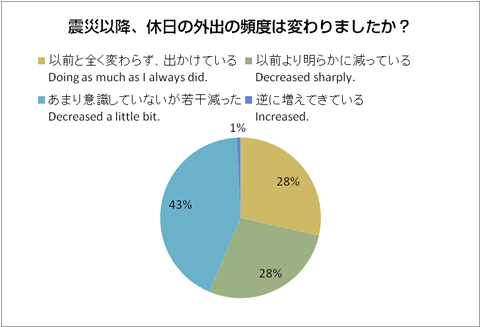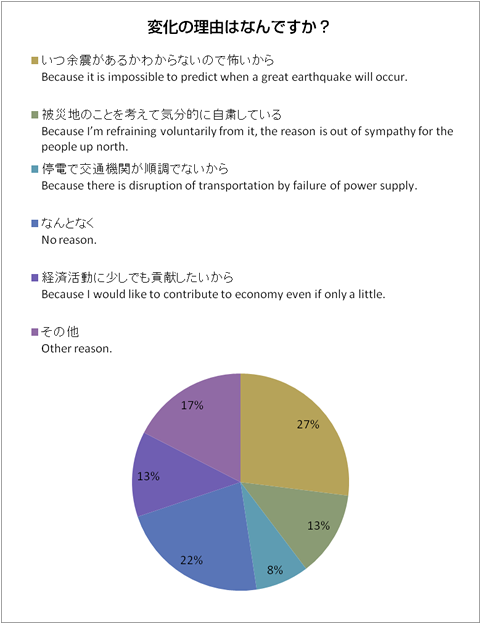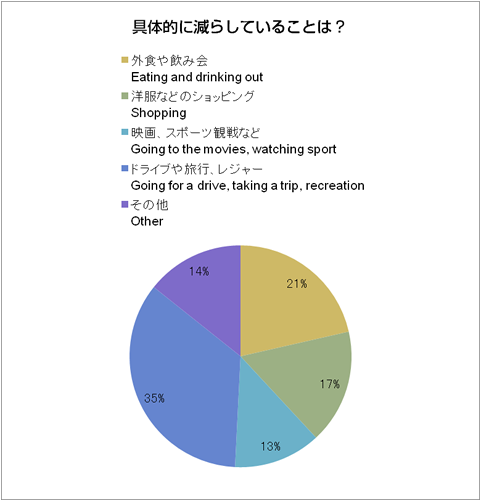3月11日以降、私たちの生活や意識はどのように変化したのでしょうか?
これからのあり方を共に考えます。
『After 3.11東日本大震災後の意識に関する調査』
survey regarding the lifestyle changes of men and women, in their 20’s, 30’s and 40’s, after the East Japan Earthquake of March 11, 2011.
株式会社コートヴィジョンは、震災後の意識に関する調査を実施しました。
今回の調査は、2011年4月18日から21日まで、CV-モニターにご登録のモニターの方々(1都3県の17?69歳の男女の内回答にご協力いただいた:有効回答計500サンプル)にご協力いただきました。ご協力いただきました皆様ありがとうございます。
調査結果
Did the frequency of your recreational activities, that is going on holidays or how you enjoy your weekend for example, change after the earthquake?
震災以降、休日の外出の頻度は変わりましたか?

If so, what is the reason for the change?
変化の理由はなんですか?

Exactly speaking, can you explain what actually changed concerning your recreational plans?
休日の外出について具体的に減らしていることは?

■レジャーや旅行、飲み会や外食の為の外出も減少傾向
遊びは意識的に控える傾向のようです。
外出以外にも、「その他」の回答として、意識的に減らしていることや心がけていることについてご意見を頂きました。具体的に頂いたご回答の一部をご紹介します。ご回答いただいた皆様、貴重なご意見ありがとうございました。
(20代女性)
- 必要最低限の生活を送れるようになった。地震がいつ来るかわからない、だから、逆に被災地の方々も一生懸命生きられているのだから私も今できることを精一杯やろうというふうに意識が変わってきた。
- 始めは余震、被災地の事、原発の事などで出かけるのが激減しました。しかし、最近は「普通」に暮らせるなら普通に生活し、経済も安定させていけるようにしたいと思い、出かけるようにしています。
(Women in their 20’s)
- I now only spend only on necessary things. As it is impossible to predict when a great earthquake will occur, and as the people in the earthquake and tsunami stricken area are doing their utmost under such constraints and hard conditions, I began to think that I too must do what I can at this moment.
- The frequency of me going on a holiday or out on the weekend has decreased sharply because of my concerns of aftershocks and radiation and so, I refrained voluntarily from going out. However, I’m trying to live and go out as before and want to contribute to the economy even if just a little.
(30代女性)
- 電気等を節約する。
- 福島第一原発の問題で、今現在、そして今後、食その他に多大な影響が出る可能性がある為、実態が分かるまで自粛しています。
- 電車を使った遠出は帰宅難民になってしまうと大変なのでなるべく避けている。
(Women in their 30’s)
- I’m saving energy.
- I’m staying quiet until the situation regarding the first nuclear power plant in Fukushima has or has not contaminate foods etc, both now and in the future, is clear.
- I try to avoid long distance trips by trains in case there is power or other problems and cannot return home.
(40代女性)
- 必ずコンセント抜けているかチェック。溜水で食器洗いなど。
- ドライブというほどの遠出ではなく、近距離での車での移動(買い物等)は、ガソリンの高騰もあり、極力控えている。
- 連日報道されている原発の情報により 小さな行動が大きな力になればと 節電を意識して行っている。
(Women in their 40’s)
- I check and if not using, pull the power cord out of the wall. I’m inserting the plug into the kitchen sink and fill it with water in order to use less water.
- As much as possible, I avoid driving my car even a short distance, for shopping etc as I can see the soaring price of oil.
- I’m trying to save energy because I studied that from many small savings, a great impact can be made. This is from information daily reported concerning nuclear power generation.
(20代男性)
- 外出頻度に増減はなく、交通機関に影響が出ることがあるので少し早い電車に乗る程度。
(Men in their 20’s)
- I don’t hesitate to go out but I try to take an earlier train.
(30代男性)
- 以前より危機感を持つようになった
- いつ物資が不足するかわからないので、生活に必要な金銭を残して貯蓄するようにしている。タバコやアルコールなどの嗜好品は購入が減りました。
- 節電・節水に今まで以上に気を使っている。
(Men in their 30’s)
- Now I have a sense of danger concerning disaster.
- I’m saving money left over after spending on basic needs so that I can buy what I need in a crisis situation. The frequency of my purchasing of cigarettes and alcohol has decreased.
- Saving energy and water than before.
(40代男性)
- 別に変化させる必要ないので何も変えていない。
- 被災地ではないので、いつも通りにしている。
(Men in their 40’s)
- I didn’t change anything about my life style because I don’t have to.
- I’m doing as I was doing before because where I live is not an earthquake stricken area.
アンケートにご協力いただきました皆様、誠にありがとうございます。今後ともよろしくお願いいたします。
調査データの転載・引用や内容に関するご質問は、こちらからお問い合わせください。
Will your company be performing questionnaire research in the Japan market? Court Vision is happy to assist you in achieving your aims in the Japan market by providing you with insightful experience across a wide range of business sectors. CONTACT US.